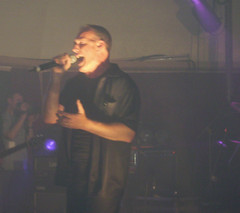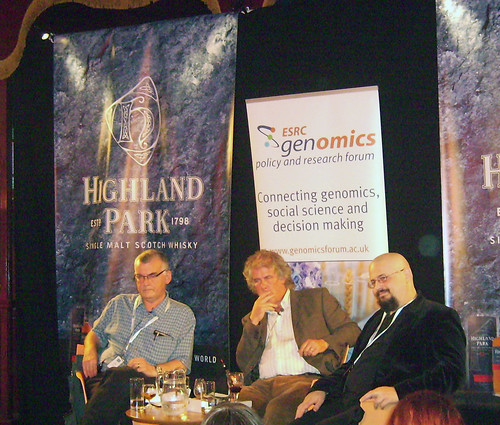Two-Fisted Engineering Tales
Ken Macleod and Charles Stross, originally uploaded by alister.Edinburgh International Book Festival
Friday 25th August
Ken Macleod and Charles Stross: "Science and Fiction"
Ken Macleod and Charles Stross are two of Scotland's most internationally known writers. Never heard of them? Well that's because they are writing science fiction. In addition they are local boys and prominent bloggers, and their work contains a remarkable number of references to obscure trotskyist groups and long-forgotten Russians, so naturally I popped along to see them at the Book Festival.
The topic for the event was 'science and fiction' and it was sponsored by the ESRC Genomics Policy and Research Forum. If you are in academia you will have submitted a grant application to the ESRC at some time. I did, they said no, and so no academia for me. As a consequence there were a few real genuine scientists in the audience itching to ask tricky questions. Both Ken and Charlie have backgrounds as computer scientists and programmers ('money for old rope' they both agreed.)
The first issue was simply squaring sci-fi and science. Ken Macleod quickly 'fessed up. Einstein was right, faster than light travel is impossible. But it is a hell of a useful plot device. Charlie Stross was equally forthcoming, sci-fi is just like any other fiction, you don't so much break the rules as suspend disbelief.
The discussion moved on to the purpose of sci-fi. Ken pointed out the most popular books are the technothrillers a la Michael Crichton (Jurassic Park et al). These are about soothing peoples fears about technology. Sci-fi proper is about the human condition.
There was an intersting interlude discussing why sci-fi is so reviled in some quarters. Charlie told the story of the 'father' of SF, Hugo Gernsback. He founded a number of SF pulps such as Amazing Stories "two-fisted engineering tales" as Ken put it. This was in the 1920's when society was in crisis and ideologies such as communism and fascism were on the rise. But SF represented another ideology…technocracy. The idea that technocrats knew best how to run society. There is still a Technocratic Party today. It was another 20th Century challenge to liberal democracy. Therefore as Charles pointed out "Science fiction had a stench of the jackboot about it's origins."
Another alternative to SF has been the emergence of actual scientists capable of writing in an engaging way about science. The likes of Richard Dawkins. Ken noted "the role of SF as the propaganda arm of the enlightenment has been replaced by actual scientists."
There was some discussion about future-shock and dystopian genres such as cyberpunk. But also more optimistic writers such as Kim Stanley Robinson. Mundane SF and writers such as Ian McDonald and Geoff Ryman, which seeks to write only about what is techically feasible, a kind of SF dogme movement, was also discussed.
Finally there was a discussion on the 'technical curiousity' of our societies. Ken and Charlie both maintained that our generation is less curious about 'how things work' than previous generations. Computers may as well be powered by pixie dust. I must say I couldn't agree with this. A quick look at any discussion board for games, music and video downloads etc, will reveal young people in particular (but not exclusively) who are quite prepared to build their own pc's, to hack and deconstruct software and to run exotic open source alternatives. The curiousity is still there.
τ
:: | 2:08 pm | | ||
0 Comments:
This is an archived story. See current posts here!



